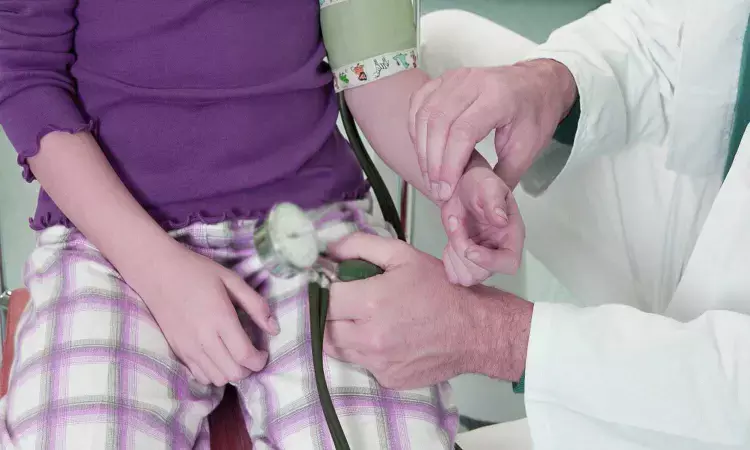- Home
- Medical news & Guidelines
- Anesthesiology
- Cardiology and CTVS
- Critical Care
- Dentistry
- Dermatology
- Diabetes and Endocrinology
- ENT
- Gastroenterology
- Medicine
- Nephrology
- Neurology
- Obstretics-Gynaecology
- Oncology
- Ophthalmology
- Orthopaedics
- Pediatrics-Neonatology
- Psychiatry
- Pulmonology
- Radiology
- Surgery
- Urology
- Laboratory Medicine
- Diet
- Nursing
- Paramedical
- Physiotherapy
- Health news
- Fact Check
- Bone Health Fact Check
- Brain Health Fact Check
- Cancer Related Fact Check
- Child Care Fact Check
- Dental and oral health fact check
- Diabetes and metabolic health fact check
- Diet and Nutrition Fact Check
- Eye and ENT Care Fact Check
- Fitness fact check
- Gut health fact check
- Heart health fact check
- Kidney health fact check
- Medical education fact check
- Men's health fact check
- Respiratory fact check
- Skin and hair care fact check
- Vaccine and Immunization fact check
- Women's health fact check
- AYUSH
- State News
- Andaman and Nicobar Islands
- Andhra Pradesh
- Arunachal Pradesh
- Assam
- Bihar
- Chandigarh
- Chattisgarh
- Dadra and Nagar Haveli
- Daman and Diu
- Delhi
- Goa
- Gujarat
- Haryana
- Himachal Pradesh
- Jammu & Kashmir
- Jharkhand
- Karnataka
- Kerala
- Ladakh
- Lakshadweep
- Madhya Pradesh
- Maharashtra
- Manipur
- Meghalaya
- Mizoram
- Nagaland
- Odisha
- Puducherry
- Punjab
- Rajasthan
- Sikkim
- Tamil Nadu
- Telangana
- Tripura
- Uttar Pradesh
- Uttrakhand
- West Bengal
- Medical Education
- Industry
2024 ESC Guidelines: Essential Ten Commandments for Managing Elevated Blood Pressure and Hypertension

Atal Bihari Vajpayee Medical College Set to Launch IPD Services
USA: The European Society of Cardiology (ESC) has unveiled its 2024 guidelines for managing elevated blood pressure (BP) and hypertension, emphasizing a patient-centered approach developed by a multidisciplinary team. The guidelines, often referred to as the "Ten Commandments," aim to improve cardiovascular health across Europe.
The guidelines were published online in the European Heart Journal on October 16, 2024.
Blood Pressure Classification
A notable change in the guidelines is the introduction of a new classification system. Blood pressure is categorized as:
- Non-elevated: Office BP < 120/70 mmHg
- Elevated BP: Office BP 120–139/70–89 mmHg
- Hypertension: Office BP ≥ 140/90 mmHg
This clear classification helps clinicians better understand and manage their patients' conditions.
Diagnosis Recommendations
The guidelines recommend out-of-office BP measurements, such as home monitoring, as the preferred method for diagnosing elevated BP and hypertension. This approach allows for more accurate readings than traditional office measurements, which can be influenced by "white coat syndrome."
Risk Assessment Protocols
Effective risk assessment is crucial for individuals with elevated BP. The guidelines outline a step-wise approach:
- Identify individuals with high cardiovascular disease (CVD) risk conditions.
- Predict the 10-year risk of CVD.
- Evaluate sex-specific and shared risk modifiers.
- Consider additional testing using various risk assessment tools.
This comprehensive risk assessment helps identify high-risk patients who may benefit from more aggressive management.
Management Strategies
For individuals with elevated BP and low CVD risk, lifestyle changes are recommended. These may include increased physical activity, dietary modifications, and weight management. For those with elevated BP and high CVD risk, initial lifestyle measures are also recommended, followed by pharmacological treatment if BP remains elevated after three months.
In cases of established hypertension, the guidelines advocate for both lifestyle modifications and medication. An initial approach using single-pill double combination therapy is suggested for most patients, facilitating better adherence and control.
Lifestyle Management Recommendations
The updated lifestyle recommendations encourage:
- Aerobic and resistance training
- Increased potassium and reduced sodium intake (less than 2g/day)
- A balanced diet
- Maintenance of a normal body mass index
- Smoking cessation and limited alcohol consumption
These lifestyle changes are crucial for managing blood pressure and improving overall health.
Target Blood Pressure Goals
For patients undergoing treatment, the guidelines recommend a target systolic BP of 120–129 mmHg. In older individuals, particularly those over 85, or those with specific health challenges, a more flexible target is advised—aiming for the lowest BP achievable without causing adverse effects.
Addressing Resistant Hypertension
For patients with resistant hypertension, the guidelines recommend the use of spironolactone or eplerenone as first-line treatments, followed by beta blockers and other medications as needed. Renal denervation is also an option for some patients.
Multidisciplinary Approach
Finally, the guidelines stress the importance of a multidisciplinary team approach in managing BP. This includes delegating responsibilities away from physicians to improve overall care and control elevated blood pressure.
In summary, the 2024 ESC guidelines for managing elevated blood pressure and hypertension provide a comprehensive framework aimed at improving patient outcomes through a combination of lifestyle changes, personalized treatment plans, and a collaborative healthcare approach.
Reference:
McCarthy, C. P., Touyz, R. M., & McEvoy, J. W. The ‘ten commandments’ for the 2024 European Society of Cardiology guidelines on elevated blood pressure and hypertension. European Heart Journal. https://doi.org/10.1093/eurheartj/ehae646
Dr Kamal Kant Kohli-MBBS, DTCD- a chest specialist with more than 30 years of practice and a flair for writing clinical articles, Dr Kamal Kant Kohli joined Medical Dialogues as a Chief Editor of Medical News. Besides writing articles, as an editor, he proofreads and verifies all the medical content published on Medical Dialogues including those coming from journals, studies,medical conferences,guidelines etc. Email: drkohli@medicaldialogues.in. Contact no. 011-43720751


